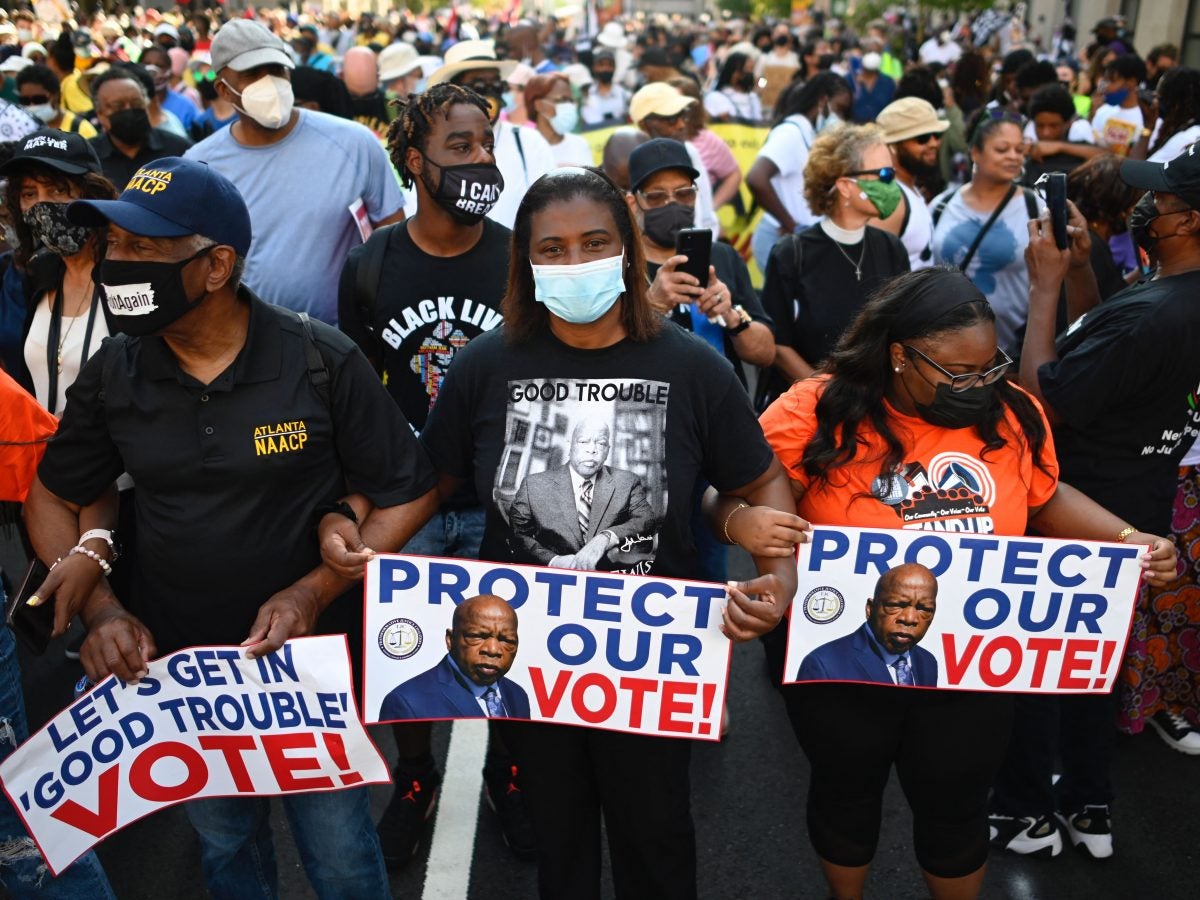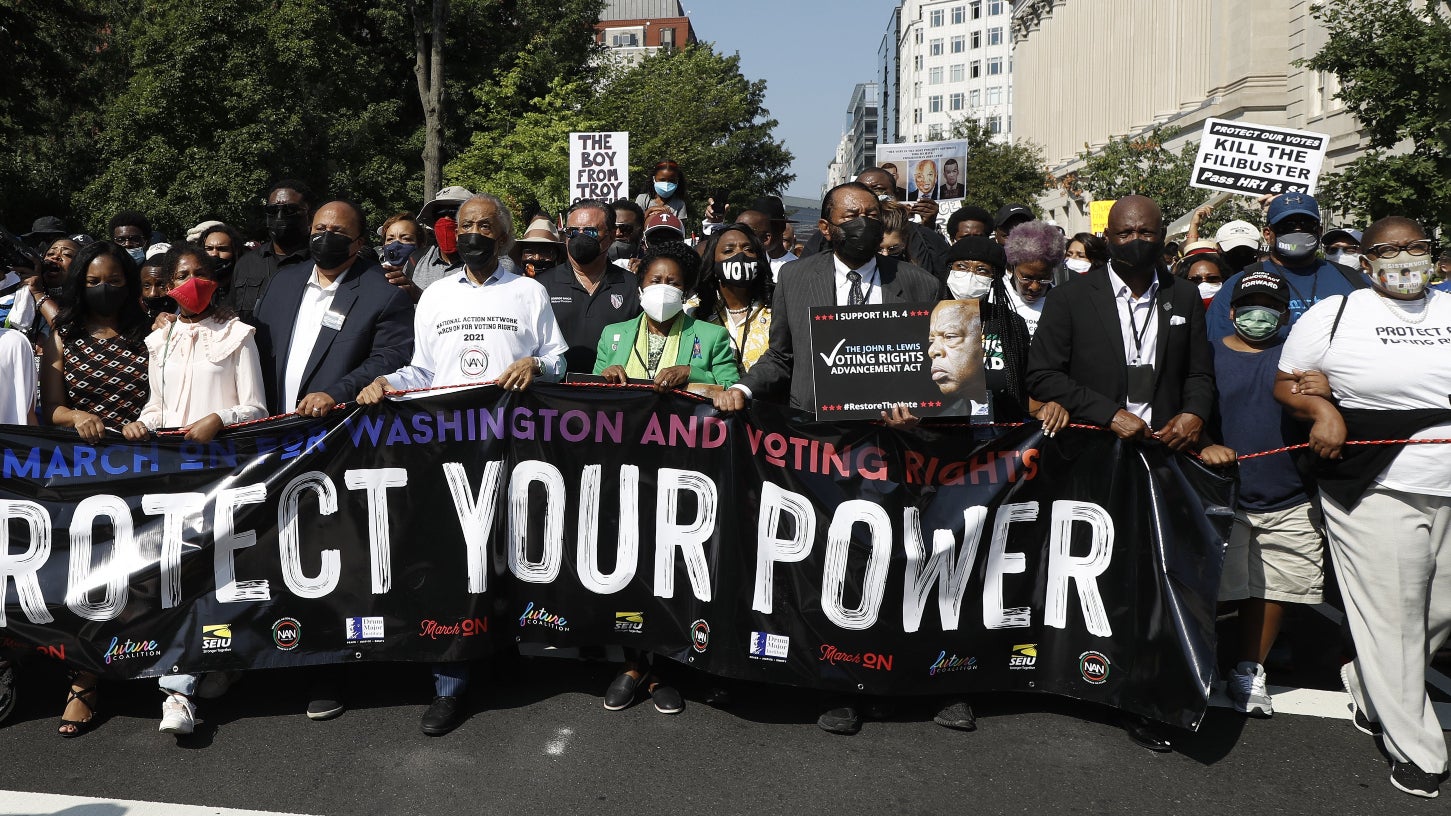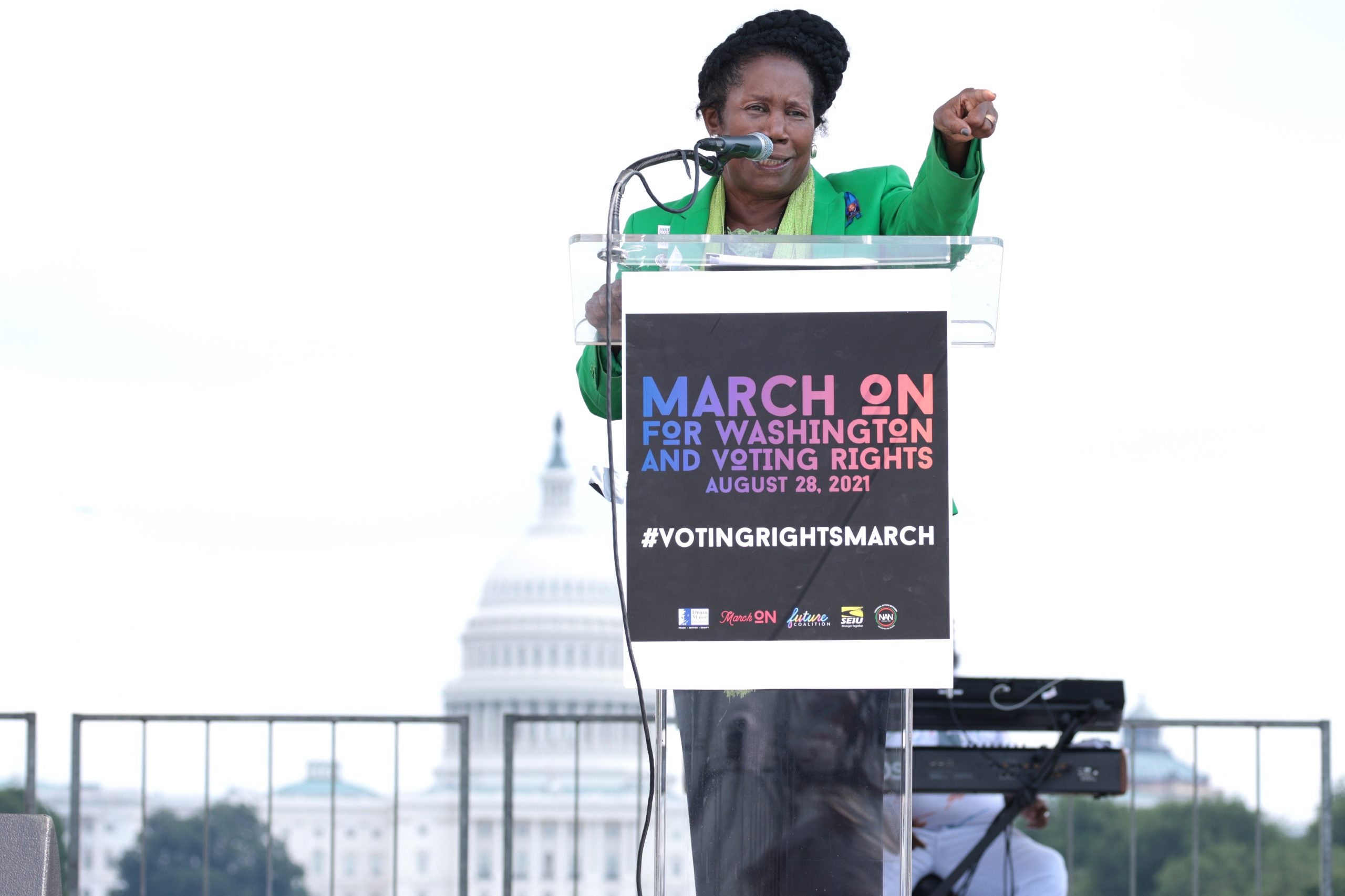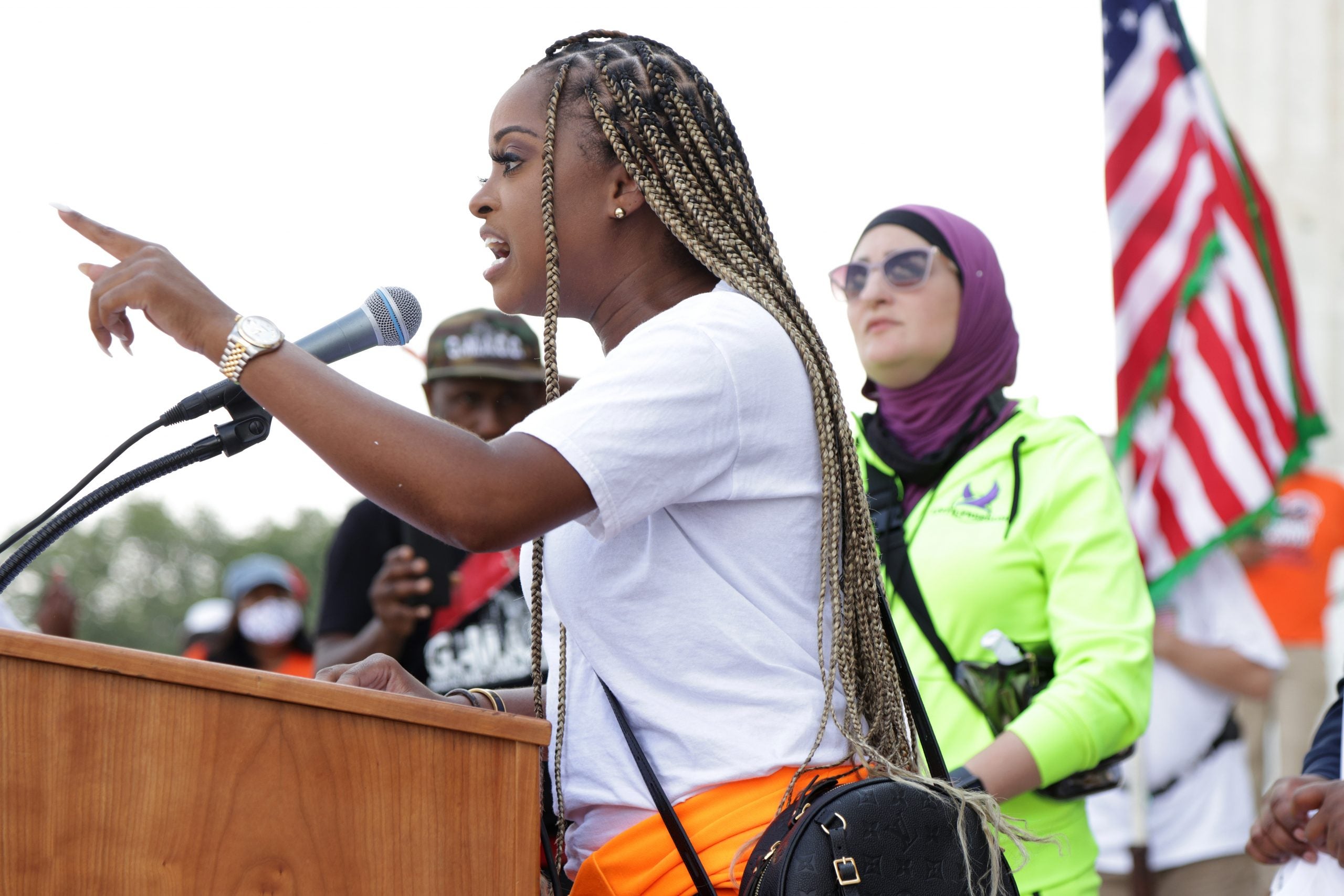
WASHINGTON, D.C. –Thousands of people marched and rallied peacefully in the nation’s capital and cities nationwide to demand swift federal action around voting rights.
A series of events on Saturday, August 28, coincided with the 58th anniversary of the historic “March on Washington for Jobs and Freedom” in 1963. Dr. Martin Luther King, Jr. delivered the now famous “I Have A Dream” speech before more than 200,000 attendees. That day, John Lewis was the youngest speaker.
Decades later, Martin Luther King III, wife Arndrea Waters King and their daughter, Yolanda Renee King, 13, are among those proudly carrying freedom’s torch. Along with Rev. Al Sharpton, they helped lead the multiracial, intergenerational March On for Voting Rights held on the National Mall.
“I march because I’m tired of elected officials putting themselves first. To be honest, I am disgusted by the behavior of many of our leaders,” said Yolanda, who is Dr. King’s granddaughter. “In this country, it’s easier to register to own a gun than it is to register to vote. Think about that.”
WATCH: ESSENCE was on the ground for the 58th anniversary of the March on Washington. Check out what we saw!
The event was organized by the Drum Major Institute, March On, the National Action Network (NAN), Future Coalition, SEIU, and 51 for 51. Nearly 200 partner organizations offered support. Marchers protested some 400 bills introduced in state legislatures nationwide. At least a dozen, including in Georgia and Arizona, are now law. Democratic lawmakers in Texas left the state in protest. While Republican lawmakers say the measures are about protecting election integrity, Democrats contend the intent is to suppress votes, especially among people of color.
“This is a battlefield of morals and you are armed with the truth, and the truth is a flame you cannot extinguish,” King III, chairman of the Drum Major Institute, told the crowd. “We will demand federal voting rights until we have them. So don’t give up, don’t give in and don’t give out. You are the dream, and this is our moment to make it true.”
Against the backdrop of the U.S. Capitol, participants ranged from activists like Alicia Garza, a co-founder of Black Lives Matter, to legacy civil rights organizations such as the NAACP, National Urban League and NAACP LDF. The National Council of Negro Women had a tent onsite, and collegiate women from its Howard University chapter showed solidarity.

Arndrea Waters King, Yolanda Renee King, the granddaughter of Rev. Martin Luther King Jr., the Rev. Al Sharpton, U.S. Rep. Sheila Jackson-Lee (D-TX), and Rep. Al Green (D-TX), and Melanie Campbell (R) participate in a March On For Voting Rights August 28, 2021 in Washington, DC. (Photo by Alex Wong/Getty Images)
Rev. Sharpton, founder/president of NAN, didn’t mince words about the urgency of the moment. “…We in Washington, you may have on a suit and tie, but we fighting the same dogs. We know who you are, because our older brothers and sisters and mothers and fathers dealt with you, and we will deal with you the same way,” he said. “Stand up and fight back. Don’t you get tired, don’t you get weary. We can win.”
D.C. Mayor Muriel Bowser and allies for statehood spoke about their ongoing fight for true enfranchisement, while other speakers called repeatedly for Congress to act on proposed federal voting rights legislation. The For the People Act and the John Lewis Voting Rights Advancement Act (H.R.4) have passed the House of Representatives, yet still require Senate support.
Multiple members of Congress took the stage. Reps. Joyce Beatty (D-OH) and Sheila Jackson Lee (D-TX)— both of whom were recently arrested for civil disobedience around voting rights— urged vigilance and courage.
“I got arrested because I believe that voting rights is determining what we are all about,” said Jackson Lee. “Yes, I’m a legislator. But the question is, do I legislate with courage, or do I step backwards?”

Rep. Sheila Jackson Lee | Photo by Anna Moneymaker/Getty Images
“We ask you to stand with us, we ask you to fight with us, we ask you to make justice for us,” said Beatty, who chairs the Congressional Black Caucus. “Because we know that there are so many injustices.”
“We’re doing our work for H.R.4, but we need help,” noted Rep. Terri Sewell (D-AL), who introduced the legislation to restore key provisions of the Voting Rights Act of 1965 stripped by Supreme Court decisions. “We need to make sure that the Senators know that we will not stand by idly and let them just filibuster [it.] Too much is at stake. Federal protections must be restored and the only way we can do that is pass H.R.4.”
In the sweltering heat, attendees sought shade under leafy trees and makeshift tents. Vendors sold T-shirts. Volunteers handed out bottled water and masks.
Emma and Gerald Caddell drove up from North Carolina. Their younger relatives Narelle Frazier and Jaboa Lake were also part of the historic anniversary. “It’s been 58 years and we’re still marching on,” Mrs. Caddell told ESSENCE. “It shouldn’t have to be this way to level the playing field.”
Monique Tripp traveled from Queens, New York with her 17-year-old Eli-sha Tripp, who proudly carried a large Black Lives Matter flag. “Our voices need to be heard,” she said.
Caleb Jackson, a Hampton University alum who is part of the new generation of civil rights attorneys, was eager to march. “I think young people are hyper-aware of what’s going on,” said the D.C. resident. “In the last eight years or so, people realize how important elections and voting rights are.”
The March wasn’t the only major event centered around voting rights. On the steps of the Lincoln Memorial, the “Make Good Trouble” rally unfolded with performances and speakers such as Rep. Cori Bush (D-MO), activist Tamika Mallory, Dr. Julianne Malveaux and the Rev. William Barber of the Poor People’s Campaign.

Tamika Mallory at the Make Good Trouble Rally | Photo by Alex Wong/Getty Images
Dozens of organizations— among them, Black Voters Matter, The Gathering for Justice, Until Freedom, Color of Change, National Black Justice Coalition, and People for The American Way— supported the gathering.
After belting out a beautiful medley of Freedom Songs, LaTosha Brown, co-founder of Black Voters Matter, asked the audience to envision a country without racism. “What would that look like?,” she asked.
DeJuana Thompson of Woke Vote told ESSENCE the current dynamics around voting and race are troubling. “America is really drawing a line in the sand,” she said. “We cannot return to policies and ideologies that suppress an entire group of people.”
Tamika Mallory, co-founder of Until Freedom called upon politicians to do more. “You wiggle and you waver,” she said. “It’s time to be courageous.”
The Make Good Trouble Rally not only centered voting rights, but highlighted a range of issues: DC Statehood, ending the filibuster; stemming gun violence; reparations; immigration reform and climate change. “We love this land and we love the human race,” said Rep. Jamaal Bowman (D-NY).
There were nearly 100 companion marches and events around the country. In Atlanta, Dr. Bernice King, Rep. Nikema Williams (D-GA), former mayor Shirley Franklin and Courtney and Corrie Cockrell, the great-nieces of civil rights leader Medgar Evers marched. The twins, who are attorneys, told ESSENCE they are helping to carry on the family legacy with love, peace and no hatred in their hearts. Chris “Ludacris” Bridges performed in ATL as well. In Miami, a `voter-cade’ and rally drew thousands. In Phoenix, an event at Pilgrim Baptist Church featured Alejandro Chavez, grandson of renowned organizer César Chávez.
Melanie Campbell, president of the National Coalition on Black Civic Participation spoke at both the march and the rally in Washington. She’s among the Black women leaders who have played pivotal roles in today’s civil rights movement.
“Have you stopped to think about why they work so hard to keep us from voting?,” Campbell asked the crowd, noting its racial, ethnic and LGBTQ diversity, range of cultures, religions, and more. “They’re afraid of the power that our vote has to dispel the old control of power that was clinched in the hands of a select few.”
Drum Major Institute President Arndrea Waters King shared a similar sentiment. “We are in the middle of an awakening in this country, and I know that you feel it,” she said. “The roar of the divine feminine will no longer be ignored. The magic of Black girls can no longer be overlooked and the power of Black women can no longer be underestimated. We have shown up for this country time and time again, even when it has not shown up for us.”
NAACP President Derrick Johnson said Black voters must remember their power. “So as we leave here and prepare for the next phase of this fight, we don’t want to hear any excuse.” Ultimately, he said, lawmakers “who depend on Black votes” must be ready to protect the vote. Indeed, Lewis often termed the vote “sacred”— one the ancestors fought, bled and died for in the quest for a more perfect Union.